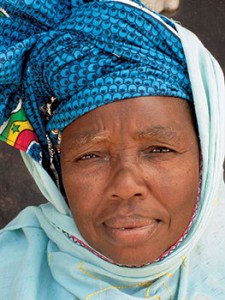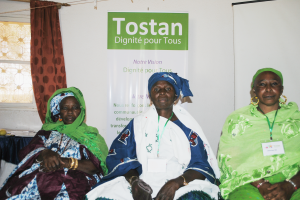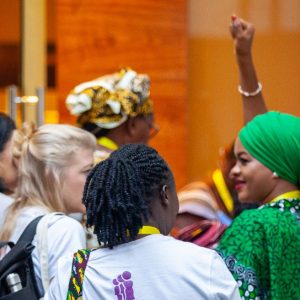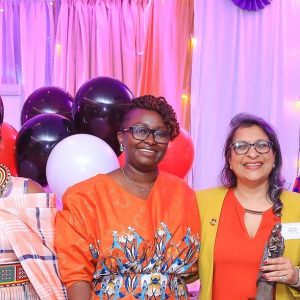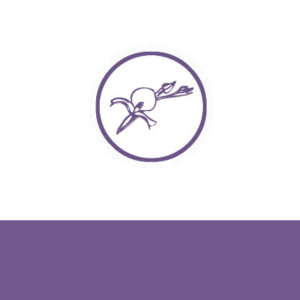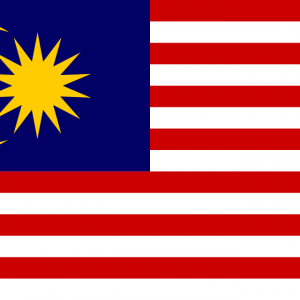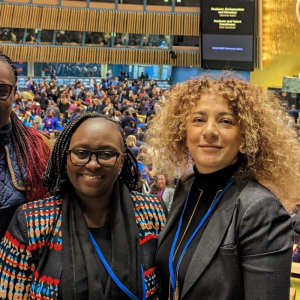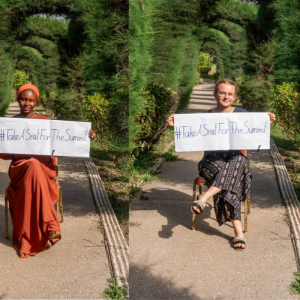Lucy, our Knowledge and Programmes Coordinator, spent two weeks in Senegal participating in the pilot of the Tostan Training Centre (TTC). Below is part four of a five part blog series…
Community Management Committees
During the training, we had a session with community management committee (CMC) members from different villages who all shared their experiences with us. A CMC is a group of 17 people, 9 of which are women, democratically chosen by the community and trained in management skills, who take forward the community’s vision for sustainable development, helping identify problems and solutions.
One CMC coordinator, an Imam, told us that the CMC plays the role of the belt (at which point he pulled up his boubou to show us his own!) – holding up the community. Another CMC member told us of her experience abandoning female genital cutting (FGC): “We never got the connection between FGC and the harm it caused. When we learned about our rights and responsibility for our children, and about the consequences of FGC through the module on health, we had something to connect the harmfulness with the practice and made the decision to abandon. Without education, you can’t understand the challenges that are related to many issues.”
We found out that Thies, where we were in Senegal for the training, had been declared a human rights city by the federation of CMCs! The coordinator of the CMC in Thies told us: “before we went through the programme in 2000, we were waiting for the government to solve many of our problems. After the programme, we realised we have responsibilities and there are things we can do ourselves. We realised garbage was a problem and provided 2,000 cans so every family has one, as well as horse and carts to carry the garbage away. We became so aware of our responsibilities we have to get involved in any issue in the community – wherever you go you will see us!”
Social norms
We also discussed FGC as a social norm. Whilst many interventions worldwide have led to attitudinal change toward the practice – in many countries the majority of men and women think the practice should end – the prevalence remains high. We discussed the links with footbinding and the similarities in the perceptions of cut women and women with bound feet: that they are more honorable and reputable and therefore more marriageable. The similarities continue when looking at how the practices end: looking at the positive aspects of being ‘natural’ footed or uncut and needing a coordinated informed effort that enables everyone to agree abandon together.
We developed a play in which the norm was to shake hands and kiss on the cheek, which we all did often and with gusto. When an announcement on the radio told us that this was no longer possible, do we listen and change our practices? Whilst one or two may stop greeting, the social sanctions for this are high and people are outcast by the community. For people to stop greeting in this way we all must change together, and for this to happen we all must have access to information – why must we stop greeting in this way and is everyone else stopping too? We must shift to a new norm such as a wave all together. Of course, the parallels here with Ebola were stark and members of the group working on Ebola planned to take the play back as an example of which interventions work and which do not.
Social Mobilisation team from Kaolack
The Social Mobilisation team from Kaolack, whom Orchid Project support, also told us their experiences in a panel discussion. The team gave a brief introduction on their work – travelling, usually on foot, to surrounding villages and people within their social networks to share information on female genital cutting (as well as other issues) and why they have chosen to abandon the practice. Some agents have visited 200 villages!
The team presented a short skit in which they debated norms and approaches, the need to not shock communities with ‘fighting’ tactics and instead discuss issues, ideas and the potential for change, showing that you are coming in to share information and people can make their own choices afterwards. Also important, they discovered was the need for mobilisation teams to come from similar communities that have the same norms, such as FGC.
Oureye Sall, former cutter
Oureye, who appears in Molly Melching’s book However Long the Night, is a former cutter who was one of the first social mobilisation agents, along with Demba Diawara. She told us: “after going through the Tostan programme I decided to give up cutting girls, convincing my mother and sister who were also traditional cutters to give up. I couldn’t stop there and reached out to as many people as possible to share the harms of the practice as it is so hard for just one or two families to stop cutting as they then can’t marry their daughters.
Communication can make you succeed or fail as the intention of communities in carrying out FGC is to do good and so if you imply that it is bad, there will be conflict. This is despite all the best intentions! I talk about my past, letting people know we are the same and I am here to share to get the best for everyone.
I no longer see discrimination. Before, people in my community wouldn’t want to sit next to someone who hadn’t been cut. Before the programme my community didn’t have the right information, even though the government wanted us to stop, we ignored them as we thought they just didn’t want us [cutters] to get income and if we went to jail, we would cut again once we got out. Now, we are aware of the harmfulness and side effects and have abandoned the practice together.”
Ibrahima Sankhare
Ibrahima was a teacher who met Oureye Sall and Demba Diawara when the first social mobilisation awareness raising team visited his village and told him about the movement to abandon FGC. They told him the purpose of their visit and what they wanted to share with his community – information on the effects of FGC and child marriage.
Ibrahima told us that, a long time ago, he had wondered if stopping the practice was possible. He shared with us how he had first come across the issue when he found his elder sister haemorrhaging after going through the cut: “I tried to heal her using traditional medicine as it was all we knew. I said that they killed her but people took me to a room and told me that she had gone through the tradition and they were taking care of her. I was very sad and sick and have been traumatised since, affected every time I see blood. It was my tradition, what could I do as a young person, they kept doing it, there was nothing I could do. Until the social mobilisation team came and I started working with them. I learned from them about their approach and I am now sharing with communities.
What Tostan does fits with religious recommendations, they teach to know who you are, about your human rights, to develop your capacities, about patience and more.
The social mobilisation team comes from different areas but when we are together working with other communities it is like we are brothers and sisters which is very important. As we discuss with communities, we see that people begin to talk about important issues that were not discussed before. All team members have been through the Community Empowerment Programme (CEP) and so we have learned the same things, have the same objectives and vision of human rights and health and have the information we need to reach out to people. We have also learned to plan activities which we do before we go out anywhere.”
Binetou Diop
“I originate from Kaolack where nobody would imagine anyone would dare to raise the question about ending FGC. It is very tough and there was a need for good, courageous volunteers to do this.
I was an assistant to cutter in my village. It was our tradition, I just did it. I was doing my job so well people thought I was a cutter as I was so involved in holding down girls. After talking to the social mobilisation team, I realised that what I was doing was not God’s work. We stopped the practice as a community and my son married outside our culture. We all knew about his human right to do this and so there was no discrimination.
Now, I have been elected to City Hall as an official and advisor. Previously, there were no women there but it was made possible through the education from Tostan. Now, in my community, people come to me with any kind of problems and we are open, we listen, advise and assist where we are needed, such as accompanying women to health centres.”
Diarty
“A few years ago, I was going through the Tostan CEP but not yet aware of the side effects of FGC. At the time, I was the assistant to a cutter, always ready to help as it was our tradition and the right thing to do. Oureye Sall was the first agent to come to my community, she came to discuss with me as I was well respected. She told me about FGC and the associated difficulties. I told her I had seen these consequences and that I would listen to her as she was a cutter. I went to visit my relatives and shared what Oureye had told me and we agreed that we needed to tell others about the practice and the possibility of abandonment. We all went to meet with the cutters in the village and with time they agreed with us, thank God. As life goes on, we have to be updated to follow it.
I said, “we will start right here in my community before we go any further”. We met with leaders and the local Imam who told us that it would be fine to stop the practice. All the community came together, 140 people, everyone. But we didn’t stop there. Madame Oureye and I went to meet with other communities until we came to agreement and people were ready to abandon – 40 communities decided it was no longer a necessary practice and decided to join together in a declaration.
I became even more confident: this is my tradition but I have nothing to fear. I was ready to go to the entire rural community and went with members of the social mobilisation team to meet with various communities. Until then, there had been real resistance and no-one had been able to succeed in work against the practice. We were the ones asked to go there and meet with people and despite the difficulties we were successful: We knew ourselves, we knew our tradition and we knew what to say.
We have organized 7 declarations resulting from our work and we are working on the 8th.
Young girls can now really focus on their studies. We are so grateful to Tostan.”
To hear everyone’s stories and understand more about their work was so moving. We decided that community management committees and social mobilisation agents were ‘social norm entrepreneurs’ – developing new norms together and sharing these in exciting ways to replace problematic old norms.

